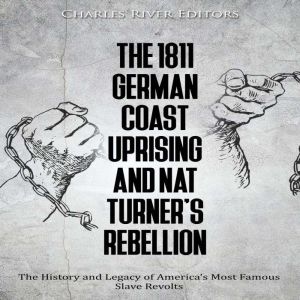
List: $6.95
| Sale: $4.87
Club: $3.47
The 1811 German Coast Uprising and Nat Turner's Rebellion: The History and Legacy of America's Most Famous Slave Revolts
Author: Charles River Editors
Narrator: Mary Rossman
Unabridged: 2 hr 15 min
Format: Digital Audiobook Download
Publisher: Charles River Editors
Published: 08/11/2023
Category: History - United States - 19th Century
Synopsis
As the issue of slavery roiled the country, few people became as controversial or consequential as Nat Turner, who was one of millions of slaves in the South before the Civil War but ultimately led the nation’s most notorious slave uprising. In August 1831, Turner led a rebellion that terrorized Virginia for several days, killing dozens of whites and freeing slaves as his band moved from plantation to plantation. The Richmond Enquirer reported, “A fanatic preacher by the name of Nat Turner (Gen. Nat Turner) who had been taught to read and write, and permitted to go about preaching in the country, was at the bottom of this infernal brigandage. He was artful, impudent and vindicative, without any cause or provocation, that could be assigned.” Even after the uprising was put down, Turner evaded capture for a few months, and after he was captured, his “confessions” were taken down and published before he was executed. Virginia would put a total of 56 slaves to death for the uprising. While Turner’s rebellion remains famous today, a far larger uprising took place a generation earlier. In January 1811, hundreds of slaves in Louisiana attempted to make a new beginning for themselves or die trying. Armed with muskets, cane knives, and axes, and wearing stolen United States militia uniforms, they set out to conquer the city of New Orleans. The goal was to establish a free republic where slavery was outlawed and blacks had control over their own lives. Understandably discontented with their status and no longer willing to accept it, they were ready to engage in extreme violence to win their freedom. Despite being unsuccessful in overthrowing the system, the German Coast Uprising showed a level of organization, leadership, and coordination unseen before by slaves in America, and it was totally unexpected by white owners and officials, which made it a precursor to its much more famous successor.